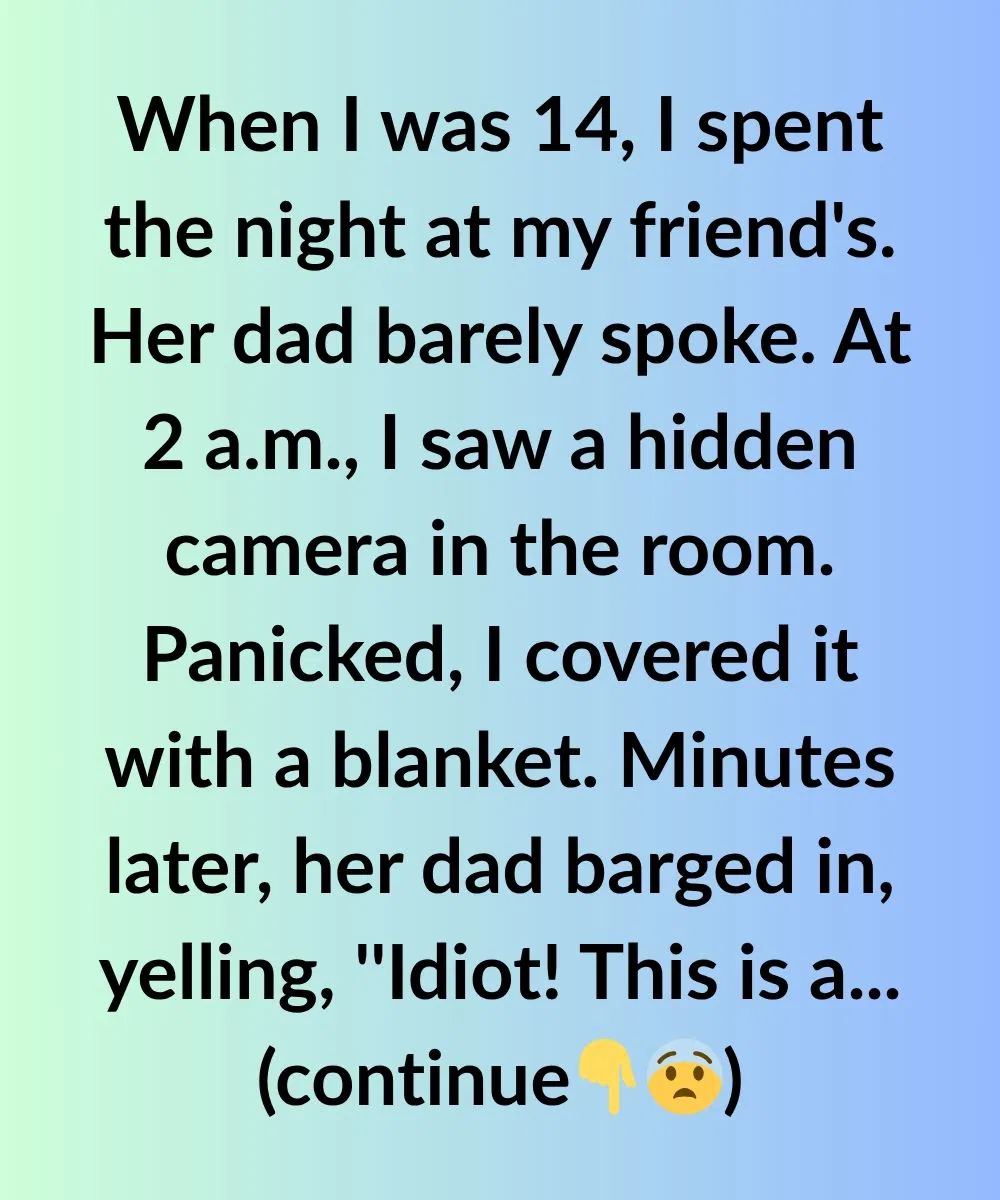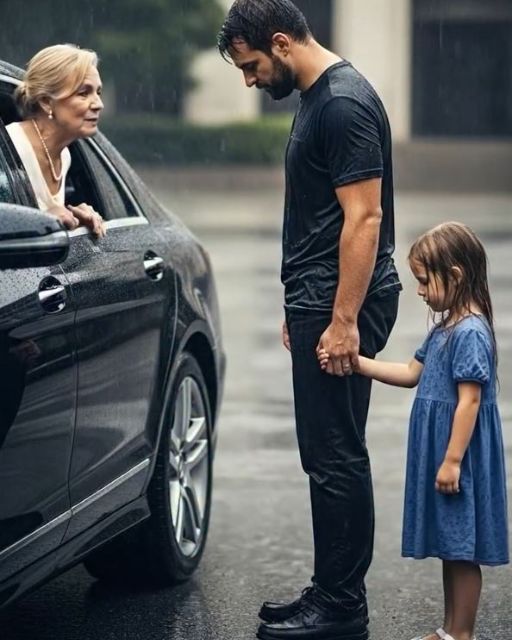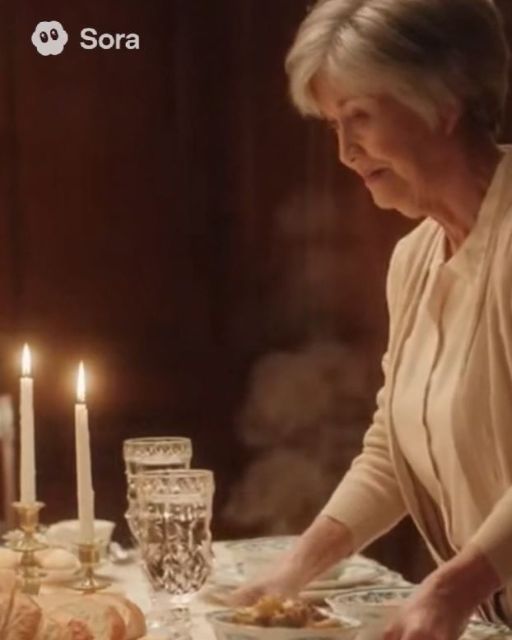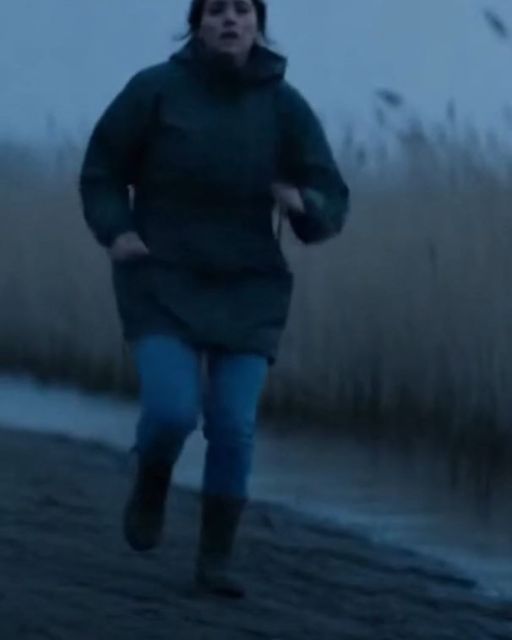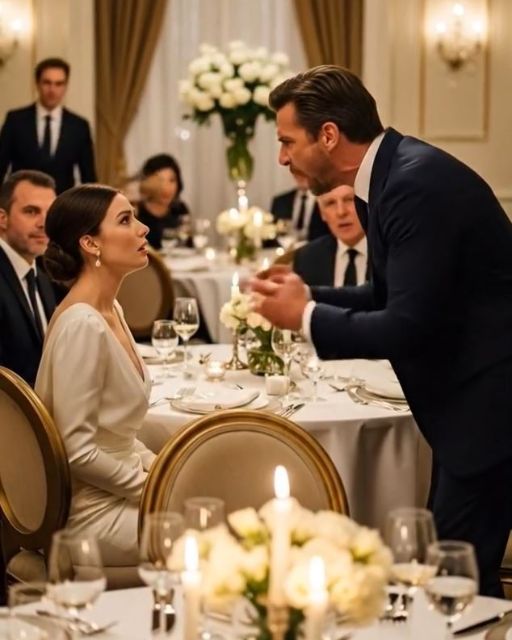When I was 14, I spent the night at my friend’s. Her dad barely spoke. At 2 a.m., I saw a hidden camera in the room. Panicked, I covered it with a blanket. Minutes later, her dad barged in, yelling, “Idiot! This is a safety camera for the fire alarm! You could’ve burned the whole house down!” He was shaking, red-faced, and I was terrified. My friend, Sorrel, just stood frozen on the bed, hugging her knees.
I remember thinking something felt off. Why would a fire alarm need a camera lens facing directly at a bed? But I didn’t dare argue. I slept the rest of the night with one eye open, heart racing every time the floor creaked. The next morning, Sorrel’s mom, Callista, acted like everything was perfectly normal. She made us oatmeal, humming softly, but I noticed her eyes darting to her husband, Gideon, every few seconds like she was waiting for a signal.
I went home that afternoon, trying to convince myself it was all in my head. But that night, I couldn’t sleep. The image of that tiny blinking light above Sorrel’s dresser burned into my mind. I told my older cousin, Orin, about it. He was nineteen, tough, and always said he’d protect me. Orin went straight to Sorrel’s house the next day, knocked on their door, and asked Gideon what the camera was for.
Gideon answered the door with a smile so fake it gave me chills. He said the camera was “part of the home security system” and suggested Orin was overreacting. But Orin wasn’t convinced. He whispered to me later, “I’ve seen enough creeps in my time to know something’s wrong.”
A week passed. I started avoiding Sorrel, making excuses not to go over. She kept calling, begging me to hang out, saying she missed me. I felt guilty, but every time I heard her dad’s voice in the background, I’d feel sick. Then one afternoon, Sorrel showed up at my door unannounced, crying. She said her dad had been accusing her of “talking to outsiders” and grounded her for days. She claimed he watched everything she did—even in the bathroom.
That’s when I knew it wasn’t just paranoia. Sorrel was living in a nightmare.
I told my mom everything. She was horrified but hesitant, afraid of making things worse for Sorrel if we reported it without proof. But Orin wouldn’t let it go. He bought a small recorder and told me to slip it into Sorrel’s backpack. I was terrified, but I did it the next time we met at the library.
A couple days later, Orin listened to hours of muffled recordings until he heard Gideon screaming at Sorrel for “covering the camera” and accusing her of plotting with me. He kept calling her disgusting names, threatening to send her away to a “special school” where “bad girls learn to behave.”
We took the recordings to the police. They opened an investigation, but things moved slowly. Meanwhile, Sorrel’s family seemed normal from the outside—perfectly manicured lawn, shiny minivan, polite Christmas cards. No one suspected a thing.
Then one evening, I got a call from Sorrel. She whispered that her dad was packing bags, saying the police were coming and they had to leave immediately. I called Orin, and he called 911. Within an hour, flashing lights lit up Sorrel’s street. Officers rushed inside, but Gideon and Sorrel were gone. The house looked like they’d abandoned it in a hurry. Clothes, dishes, Sorrel’s homework—everything left behind.
Days turned into weeks without any word. The police put out a missing persons alert. I kept checking the news every day. Then one morning, a neighbor spotted Gideon’s car parked outside an old, abandoned motel an hour away. Police found Sorrel locked inside a room, scared and hungry but unharmed. Gideon was arrested trying to climb out a back window.
Everyone thought that was the end, but it wasn’t. Sorrel was placed with her aunt, and I visited her often. At first, she was jumpy, barely speaking. Slowly, she started laughing again. But one day, Sorrel told me something that made my stomach drop. She remembered her dad always watching VHS tapes alone late at night. Tapes with my name written on them.
That’s when I realized the camera hadn’t just been on when I visited—it had been recording me, too. I told the police, and they confirmed Gideon had a stash of tapes labeled with dates and names of Sorrel’s friends. He’d been secretly filming us for years.
The trial was long and ugly. Gideon’s lawyer tried to paint him as an overprotective father. But the recordings sealed his fate. He was sentenced to 25 years. The entire neighborhood was stunned. People kept saying, “But he was such a nice guy,” and “We never imagined…”
During the trial, I learned something else that shocked me. Sorrel’s mom, Callista, had known about the cameras for years. She claimed she was too afraid to leave. But a journal found in their bedroom suggested she’d helped install some of the equipment. She pleaded guilty to child endangerment and served time herself.
I felt betrayed by an adult I thought was kind. But as Sorrel and I spent more time together after it was all over, we helped each other heal. We’d go on long walks, venting about everything, or lie on the grass watching clouds, finally feeling safe.
One afternoon, Sorrel confessed she’d always envied my life. She thought my family was perfect compared to hers. I told her my dad left when I was five and we always struggled with money. She looked shocked, then relieved, like realizing everyone has their own battles.
By the time we started high school, Sorrel was living with her aunt permanently. She joined the debate team, got straight A’s, and even tutored younger kids. I’d never seen her so alive. We’d talk about college, daydreaming about leaving the town that had held so many nightmares.
But there was one more twist neither of us expected.
About a year later, Orin got a letter from Gideon, sent from prison. In it, he tried to blame me for “ruining his family,” saying Sorrel’s life would’ve been better if I’d kept my mouth shut. Orin burned the letter without showing me, but he told me what it said. I was furious at first. Then I realized Gideon’s words only proved he hadn’t changed. He was still trying to control us, even from behind bars.
We decided not to let him win. Sorrel and I focused on school, on the future. We kept each other grounded, reminding ourselves how far we’d come.
A couple years later, Sorrel’s aunt moved closer to my neighborhood so we could carpool to school. Those car rides were our therapy sessions. We’d blast music, share secrets, or sit quietly, comfortable in each other’s presence.
On the day we graduated high school, Sorrel’s aunt took pictures of us in our caps and gowns, hugging so tightly I thought we’d never let go. We promised each other we’d keep chasing our dreams, no matter what.
We both got accepted into colleges in the same city. Moving into our dorms felt like a fresh start. We decorated our tiny shared room with photos of our childhood, reminders of where we’d been and how much we’d survived.
Every so often, Sorrel would wake up crying from nightmares about her dad bursting into her room. I’d hold her hand until she fell asleep again. Some nights, it was me who needed the comfort. But we were always there for each other.
Through therapy and time, those nightmares became less frequent. We learned to breathe through the panic, to remind ourselves we were safe.
We both studied psychology, determined to understand how someone could do what Gideon did—and how to help others who’d been hurt. Sorrel wanted to work with abused kids; I leaned toward counseling survivors of trauma.
During our second year, we were invited to speak at a youth safety conference. Standing on stage, telling our story together, felt terrifying but powerful. Afterward, parents and teenagers came up to thank us, saying they’d check their own homes and talk openly about safety.
That night, Sorrel and I sat on our dorm balcony, legs dangling over the edge. We looked out at the city lights, realizing we’d turned the worst thing that happened to us into something that could help others.
I learned that bravery doesn’t always look like fighting back in the moment. Sometimes, it’s speaking up later. Sometimes, it’s holding someone’s hand so they don’t feel alone. And sometimes, it’s forgiving yourself for not knowing what to do when you were just a kid.
If there’s one thing I want everyone to take from our story, it’s this: trust your gut. If something feels wrong, don’t brush it aside. Tell someone. Keep telling until someone listens. And don’t ever let fear convince you to stay silent.
Life can be unfair and scary, but it can also surprise you with kindness in unexpected places. Sorrel and I didn’t just survive—we built lives we’re proud of, and we did it together.
If you found our journey moving, please share this post and like it so more people know they’re not alone. You never know who might need to hear that there’s hope—even after the darkest nights.
